Helena Halme's Blog, page 26
October 7, 2015
CoScan magazine is now online
Just a quick note to let you know that a magazine for which I write articles about Finland, is now online.
CoScan, or confederation of Scandinavian Societies of Great Britain was set up in 1950 and acts as a coordinating body for societies which work for cultural exchange between UK and Ireland on the one hand and the five Scandinavian countries, Denmark, Finland, Iceland, Sweden and Norway, on the other.
My article on Finnish tango is on page 14, and there's also a really lovely and insightful review of my novel, Coffee and Vodka on page 31.
You can see the magazine here, and join CoScan here.
Published on October 07, 2015 05:56
October 2, 2015
Advice for New Writers Part 2: I've Completed the First Draft - What Now?
Last time in this series of posts about what to do if you have an idea for a book, I talked about reading in your genre and writing as much as possible. Today, I'm going to talk about what to do when you've finished the first draft.
What to Do When You've Completed the First Draft?
When you've completed a manuscript, the first thing you need to do is CELEBRATE!
Well done, you've written a novel!
 But the next day, you need to get down to work again, and start editing. This is my least favourite task of the whole writing process, but we are all different, and this might be something that you particularly enjoy. It is, after all, easier to make something of something that already exists, rather than create the words and stories out of thin air. That work is now done.
But the next day, you need to get down to work again, and start editing. This is my least favourite task of the whole writing process, but we are all different, and this might be something that you particularly enjoy. It is, after all, easier to make something of something that already exists, rather than create the words and stories out of thin air. That work is now done.
Remember, the first draft is just that - a draft. You need to use all your powers of objectivity, and check that the plot, characters, dialogue, and back story work. You need to fact check, make sure all the place and character names etc. are used consistently throughout the novel. You need to make sure that the style of the novel is right for its genre, and of course, you need to check for spelling, grammar and point of view. The more of this work you do now, the less of it is left to your editor. (If you want to employ a professional editor, that is - see below)
There are a lots of editing help online, start by checking out the ALLi blog and site here.
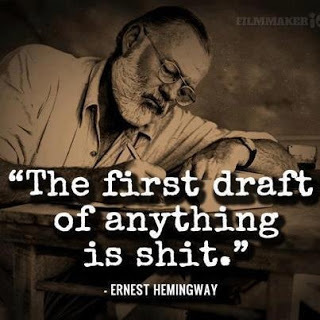
How Many Drafts?
Unless you are a very skilled at self-editing while you write, the first draft will be one of several drafts. I think all of my books went over the ten draft limit - one of them, The Red King of Helsinki, I completely re-wrote on the advice of an agent. I basically wrote two novels on the same subject! Coffee and Vodka was part of my MA in Creative Writing course work, and this novel too went through many versions - it even had a different title for a while. The Englishman, my third novel, was born out of a series of blog posts, written in first person. For the novel version I changed the POV from first to third, and added a little more back story. So, anything goes as long as you remember what Hemingway said...
Who Should Read Your Manuscript First?
Once you've edited your book, around three or more drafts later, it's time to show your book to some-one else. I tend to show my early drafts to my husband - he does the first corrections, and also tells me if the book is any good or not. This, as you may imagine isn't the happiest of solutions, but it works for us (and we are still married after three novels and many, many drafts).
But, apart from a very critical and honest partner, I would strongly advise you not to show your work to family and friends for evaluation. They will not give you an unbiased opinion, simply because they love you. Even unwittingly, they'll think the novel better and funnier (if you wish it to be), or tragic (if that's what you're after) than it is.
Instead, try to show your work to some-one who doesn't know you and who will give you a brutally independent opinion. Because, when it comes to sending your baby out into the world, it will be bruised, or rather the criticism will bruise your ego, so why not begin with constructive criticism from just a few people? Criticism, which you can follow or not, according to what you yourself think. It's your book after all!
It's quite easy to find people you don't personally know, but whose opinion you value, online. (I'll be talking about the importance of networking in a later post). Because my first published novel, The Englishman, began as a series of posts on this blog, I was lucky to have several people who'd already read bits of the book and were willing to read a draft, and give their honest opinions on it.
So, just go ahead and ask. The worst reply you can have is a 'no'.
I asked about ten people to read The Englishman manuscript, and three of them actually read it. Some didn't reply, some said they would read it, but didn't come back to me. This is just something you have to accept. Reading and critiquing your work is a huge favour, so be nice about it, even if the response is negative or there's no response at all. As an author, you are always under scrutiny, especially online, so be polite, and don't take rejection personally. Developing a thick skin is one of the most valuable skills you can learn. I'm still working on that one....


Editor or No Editor?
After you've shown your work to as many people as you can, (but remember it will take time for people to read your manuscript, so if you're in a hurry to get it published, think about who to ask well in advance), and you've made the necessary corrections and edits, it's time to have an experienced editor to have a look at it.
Even if you consider going the traditional publishing route, i.e. finding an agent, who will find you a publisher with an editor, I'd recommend using a professional independent editor to look at your manuscript before you approach an agent. Professional editors can make a good manuscript into a brilliant one, so they're worth their weight in gold.
How to Find an Editor?
There is a list of editors on the Alliance of Independent Authors site - this will cost you money, but is well worth it. If you don't use one on that list, beware. The rise of the independent author/publisher has created a whole industry wanting to take advantage of an ambitious would-be author, so make sure that the editor you choose comes with proven credentials.
Can I Self-Edit?
Having said all of the above, there are ways in which you can make the final edits yourself. There are several websites and books written on the subject. If you don't have the funds to invest in a good editor, I think this is a viable route. Personally, I find it difficult to see some of my own spelling mistakes, or even plot issues in a manuscript which I've written and rewritten over and over, but this is just me. Many indie authors edit their own work very successfully, so it's more than possible to do it yourself.
I hope you've enjoyed my advice for new writers so far. If you missed Part 1, you can read it here.
Don't miss a post - sign up for my Newsletter here!
Next month, I'm going to be talking about how long it usually takes to write and publish a novel. This post should be up on Friday 6th November. In the meantime, if you have any questions, please comment below, I'd love to hear your stories and how you are getting on with your writing!
What to Do When You've Completed the First Draft?
When you've completed a manuscript, the first thing you need to do is CELEBRATE!
Well done, you've written a novel!
 But the next day, you need to get down to work again, and start editing. This is my least favourite task of the whole writing process, but we are all different, and this might be something that you particularly enjoy. It is, after all, easier to make something of something that already exists, rather than create the words and stories out of thin air. That work is now done.
But the next day, you need to get down to work again, and start editing. This is my least favourite task of the whole writing process, but we are all different, and this might be something that you particularly enjoy. It is, after all, easier to make something of something that already exists, rather than create the words and stories out of thin air. That work is now done.Remember, the first draft is just that - a draft. You need to use all your powers of objectivity, and check that the plot, characters, dialogue, and back story work. You need to fact check, make sure all the place and character names etc. are used consistently throughout the novel. You need to make sure that the style of the novel is right for its genre, and of course, you need to check for spelling, grammar and point of view. The more of this work you do now, the less of it is left to your editor. (If you want to employ a professional editor, that is - see below)
There are a lots of editing help online, start by checking out the ALLi blog and site here.

How Many Drafts?
Unless you are a very skilled at self-editing while you write, the first draft will be one of several drafts. I think all of my books went over the ten draft limit - one of them, The Red King of Helsinki, I completely re-wrote on the advice of an agent. I basically wrote two novels on the same subject! Coffee and Vodka was part of my MA in Creative Writing course work, and this novel too went through many versions - it even had a different title for a while. The Englishman, my third novel, was born out of a series of blog posts, written in first person. For the novel version I changed the POV from first to third, and added a little more back story. So, anything goes as long as you remember what Hemingway said...
Who Should Read Your Manuscript First?
Once you've edited your book, around three or more drafts later, it's time to show your book to some-one else. I tend to show my early drafts to my husband - he does the first corrections, and also tells me if the book is any good or not. This, as you may imagine isn't the happiest of solutions, but it works for us (and we are still married after three novels and many, many drafts).
But, apart from a very critical and honest partner, I would strongly advise you not to show your work to family and friends for evaluation. They will not give you an unbiased opinion, simply because they love you. Even unwittingly, they'll think the novel better and funnier (if you wish it to be), or tragic (if that's what you're after) than it is.
Instead, try to show your work to some-one who doesn't know you and who will give you a brutally independent opinion. Because, when it comes to sending your baby out into the world, it will be bruised, or rather the criticism will bruise your ego, so why not begin with constructive criticism from just a few people? Criticism, which you can follow or not, according to what you yourself think. It's your book after all!
It's quite easy to find people you don't personally know, but whose opinion you value, online. (I'll be talking about the importance of networking in a later post). Because my first published novel, The Englishman, began as a series of posts on this blog, I was lucky to have several people who'd already read bits of the book and were willing to read a draft, and give their honest opinions on it.
So, just go ahead and ask. The worst reply you can have is a 'no'.
I asked about ten people to read The Englishman manuscript, and three of them actually read it. Some didn't reply, some said they would read it, but didn't come back to me. This is just something you have to accept. Reading and critiquing your work is a huge favour, so be nice about it, even if the response is negative or there's no response at all. As an author, you are always under scrutiny, especially online, so be polite, and don't take rejection personally. Developing a thick skin is one of the most valuable skills you can learn. I'm still working on that one....


Editor or No Editor?
After you've shown your work to as many people as you can, (but remember it will take time for people to read your manuscript, so if you're in a hurry to get it published, think about who to ask well in advance), and you've made the necessary corrections and edits, it's time to have an experienced editor to have a look at it.
Even if you consider going the traditional publishing route, i.e. finding an agent, who will find you a publisher with an editor, I'd recommend using a professional independent editor to look at your manuscript before you approach an agent. Professional editors can make a good manuscript into a brilliant one, so they're worth their weight in gold.
How to Find an Editor?
There is a list of editors on the Alliance of Independent Authors site - this will cost you money, but is well worth it. If you don't use one on that list, beware. The rise of the independent author/publisher has created a whole industry wanting to take advantage of an ambitious would-be author, so make sure that the editor you choose comes with proven credentials.
Can I Self-Edit?
Having said all of the above, there are ways in which you can make the final edits yourself. There are several websites and books written on the subject. If you don't have the funds to invest in a good editor, I think this is a viable route. Personally, I find it difficult to see some of my own spelling mistakes, or even plot issues in a manuscript which I've written and rewritten over and over, but this is just me. Many indie authors edit their own work very successfully, so it's more than possible to do it yourself.
I hope you've enjoyed my advice for new writers so far. If you missed Part 1, you can read it here.
Don't miss a post - sign up for my Newsletter here!
Next month, I'm going to be talking about how long it usually takes to write and publish a novel. This post should be up on Friday 6th November. In the meantime, if you have any questions, please comment below, I'd love to hear your stories and how you are getting on with your writing!
Published on October 02, 2015 06:00
October 1, 2015
Which Famous Finn from History Are You?
I know this quiz has probably done the rounds a few times already, but I'd not seen it before, so I thought I'd share it with you for a bit of Thursday morning fun.
I got Tove Jansson, the famous creator of the Moomintrolls; a perfect fit for me! Which famous person from Finland's history did you get?
I got Tove Jansson, the famous creator of the Moomintrolls; a perfect fit for me! Which famous person from Finland's history did you get?
Published on October 01, 2015 01:44
September 25, 2015
Sequel to The Englishman Name Reveal!
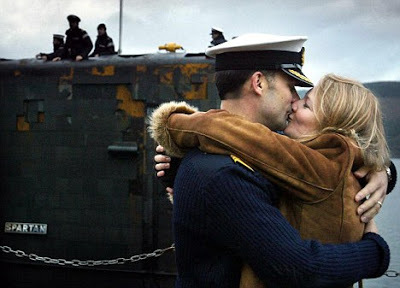 Photo: Dailymail.co.ukMost of you know by now that I am busily writing the long-awaited sequel to The Englishman. (At last you may say!). The first draft of the manuscript is now done, and I am working on my first edit. It's going well, although this stage of writing a novel is my least favourite one, because it's where you have to be strict with yourself. It's mostly fact-checking and making sure all dates, time-lines and characterisations make sense. And of course the plot itself has to be exciting, but also believable.
Photo: Dailymail.co.ukMost of you know by now that I am busily writing the long-awaited sequel to The Englishman. (At last you may say!). The first draft of the manuscript is now done, and I am working on my first edit. It's going well, although this stage of writing a novel is my least favourite one, because it's where you have to be strict with yourself. It's mostly fact-checking and making sure all dates, time-lines and characterisations make sense. And of course the plot itself has to be exciting, but also believable.Yesterday I had a bit of low moment, realising I had to cut a whole section of the book, but today here in London the sun is shining and I can see that the novel will be a much better one without those few chapters. Luckily the word count of the first draft is generous, so I don't have add too much to the story. It's all about, 'Killing your darlings,' as William Faulkner famously said.
But, for those of you who are not fellow authors, all the above must be boring, boring, so let's get down to the reason for this blog post, and the title of my next novel. (Drumroll please...)
The sequel to The Englishman will be called:
The Navy Wife
I hope you like this title - it's simple, but I think it certainly says what it is on the tin...
I'm also delighted to announce that I'll be working with a wonderful, talented, Finnish designer for the cover of The Navy Wife. I cannot wait to see how she interprets the story.
In the next two weeks I'm running a competition related to the cover. Sign up to get my updates on the right, so that you don't miss it!
If you'd like to see the pictures I've been using as a mood board for the novel, you can pop over to my Pinterest page here. And of course if you haven't read The Englishman, a Nordic tale of long-distance love, now is the perfect time to get it here!
Published on September 25, 2015 08:30
September 24, 2015
Good news for Finnish translated fiction
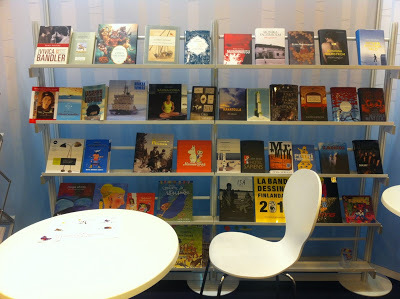
Many people ask me for recommendations on Finnish translated fiction. Since the explosion of the Nordic Noir genre, readers are particularly interested in similar books to Stieg Larsson's Millennium trilogy, or the Norwegian Detective Harry Hole series by Jo Nesbo, or even something like the Swedish Wallander series.
Naturally there are several books I could recommend, but the problem is that many of my favourite authors are not translated into English. Alternatively, the translations take so long that the novels seem out of date when they're published into English. In the crime genre, in particular, the police procedures etc. change very quickly, making the Finnish novels seem out of touch and old-fashioned when they finally come out in English.
Traditionally Finnish fiction is first translated into Swedish, and some of the other Nordic and Baltic languages, and then into German. English-language versions have to wait for years, or are never published. This has always seemed perverse to me; after all the English-language market is huge, and with the surge in interest in Nordic fiction, to me it would seem natural that this market would be a prime focus for Finnish publishers.
But, now it seems there's good news. This is from the press release of the Finnish Literature Exchange, FILI. FILI has the job of promoting Finnish literature around the world.
FILI focuses on exporting literature to the English-speaking worldA giant leap for translation rights sales figures took place during the preparations for the Frankfurt Book Fair, at which Finland was the Guest of Honour. The German markets have functioned as a gateway to other language areas, and interest is a particular challenge in the English-language markets, on which FILI is focusing its next three-year major project. In the United States and the United Kingdom we are focusing on local publishers, the training of new translators, and the promotion of published translations in conjunction with our local partners.FILI continues to function as a mediator of professional contacts: we take part in trade fairs and invite foreign publishers to Finland to acquaint them with Finnish literature. We also act as a home base for Finnish literary translators, and one of our more important tasks is to find more translators in the various language areas.Let's hope this new push to increase exports of Finnish literature to the English-speaking world will increase titles of my favourite authors from Finland in the future.
Published on September 24, 2015 05:59
September 16, 2015
A Spool of Blue Thread by Anne Tyler - 2015 Booker shortlisted novel
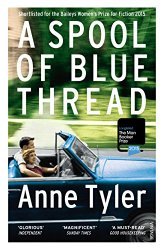

My rating: 3 of 5 stars
Anne Tyler’s books are never predictable – she creates characters that you love to love, but also those that you love to hate and those you cannot get any grip on at all. In A Spool of Blue Thread, among the Whitshanks, there are very few characters that you could even begin to love.
The family of Whitshanks (or Shitwanks as one of the sons' friends rename them) live in a large house in Baltimore, with wooden steps and a wooden porch, lovingly built by their grandfather, the talented carpenter. They think they are special, but as Tyler writes, ‘There was nothing remarkable about the Whitshanks.’ A statement such as this, quite early on in a novel, about the subject matter of your book, is brave. No author usually wishes to tell her audience that the characters are unremarkable. But then Tyler has a strong career behind her, so she can afford be brave.
Tyler is also correct, there is nothing special about the Whitshank family. The long-suffering Abby, who as the family matriarch do-gooder puts up with her husband, Red’s stubbornness and her children’s selfishness is an annoyingly scatty-brained character. As well as looking after her four children, she fills her life with ‘misfits, loners and unfortunates’ for whom she holds what the family have dubbed, ‘orphan dinners’. But much like her family, these loners too, soon take advantage of her generosity.
There are four children, Amanda, Jeannie and the troubled Denny, plus Stem, the latecomer. When Red, who runs the family construction company falls ill, the grown-up children with families in tow all arrive at Abby and Red's side, and although on the surface they seem concerned about their ageing parents, their old sibling rivalries soon begin to show.
Perhaps the characters were just too true to life, but I had difficulty in identifying with any of them. There are many funny moments in the book, and at the end, I felt great sadness, but I still don’t think this novel, which has just made the Booker short list, is Ann Tyler’s best work.
View all my reviews
Published on September 16, 2015 04:44
September 15, 2015
Suffragette Season at the Houses of Parliament in London
I've been looking forward to this film ever since it was announced about a year ago that 'Suffragette' would star Carey Mulligan AND Meryl Streep, AS WELL AS Helena Bonham-Carter, and that parts of the action would be filmed at the Houses of Parliament. And now, to celebrate the release of this British film, the Houses of Parliament is running a 'Suffragette Season' of special events and themed tours this October. I can't wait to attend one of these.
HOUSES OF PARLIAMENT ANNOUNCES A ‘SUFFRAGETTE SEASON’ OF SPECIAL EVENTS AND TOURS IN OCTOBER 2015 – TICKETS NOW AVAILABLEDirected by Sarah Gavron and starring Carey Mulligan and Meryl Streep, the film 'Suffragette' was inspired by the true stories of the foot soldiers of the women's suffrage movement and their fight for the right to vote.'Suffragette Soirée' on Wednesday 7 October 2015 at 6.30pmGo back in time to meet Suffragettes and other suffrage activists, see ‘behind the scenes’ and discover moments of history in the 'Votes for Women!' movement.Enjoy a truly unique Suffragette-themed tour of the House of Commons followed by a convivial three course dinner in the elegant Members’ Dining Room. The House of Commons' chefs have adapted the menu from a public banquet chaired by Emmeline Pankhurst on Friday 12 May 1911 and given it a modern twist.The 1911 banquet was in honour of the Lord Mayor of Dublin and the Lady Mayoress and marked their visit to London to present the Petition of the Corporation of Dublin in support of the Woman Suffrage Bill at the Bar of the House of Commons.Tickets for this one-off dining event are £97, booking by phone only on 020 7219 4114.'More than Suffragettes' Talks and Tour on 8 and 9 October 2015 at 2pmFollowing a 30 minute introductory tour including the Lords Chamber and Commons Chamber, visitors will hear about the campaign by suffragettes and suffragists for the vote in Parliament and how Parliament remembers this campaign today. The speakers are Mari Takayanagi from the Parliamentary Archives, Melanie Unwin from the Parliamentary Art Collection and Mary Branson, Artist-in-Residence to women’s suffrage.Tickets are £25, bookable online at www.parliament.uk/suffragette-season or by phone on 020 7219 4114.‘Votes for Women!’ Family Tours on Saturday afternoons in October at 2pm and 3pmDesigned especially for families visiting Parliament, the afternoon begins with a 45 minute tour through the House of Lords and the House of Commons followed by a range of optional Votes for Women-themed activities. The 'Votes for Women!' family tours are ideal for children aged 7 and over.Tickets are free for children and £10 for adults, bookable online at www.parliament.uk/suffragette-season or by phone on 020 7219 4114.‘From Petitions to Prime Minister: A Short History of Women in Parliament’ on Saturday afternoons in October at 1pmLed by a ‘Blue Badge’ guide, Parliament’s regular guided tour through both Houses has been adapted to focus on the journey from early petitioning about women’s suffrage through to the UK’s first (and so far) only female Prime Minister and the prominent role of women in Parliament today.Tickets are £25, bookable online at www.parliament.uk/suffragette-season or by phone on 020 7219 4114.
Published on September 15, 2015 10:06
September 13, 2015
German Literary Critic Reviews IKEA Catalogue
I just had to share this with you. The new IKEA catalogue is out and is reviewed by a German literary critic. This shows what brilliant PR people those cunning Swedes are. I'm almost jealous. (Very, actually).
Published on September 13, 2015 07:21
September 4, 2015
Advice for New Writers Part 1: I have a great idea for a book - what should I do next?

I must be getting old, because I am often asked for advice about writing by young (and not so young) authors, who are just starting out, and wondering what they should do to get a book out and published.
Last week, I was speaking to yet another one. She had an idea for a book, which she was visibly excited about, and a great urge to write. She told me that she wrote each night after work - she even had a particular time of the night when she'd sit down and write. It was a pleasure to give her tips on how to proceed, and our discussion inspired me to share some of the things I told her about the industry, and about writing in general.
These are my own personal pieces of advice, learned through being part of this rapidly changing book world for the past ten or so years.
For those who wish to know if I have any credentials to pass on such advice, I can tell you that I've got a MA in Creative Writing; I've had various run-ins with literary agents in the traditional publishing area; I've been a book-seller and now I'm a proud self-published author and an active member of the Alliance of Independent Authors, as well as reviewer of Awesome Indies. I've published three novels, two of which are AIA accredited. I'm Chief Editor of the Finn-Guild magazine, Horisontti, and have articles published in various magazines.
This will be a series of blog posts about what I've learned so far. I am mainly talking here about fiction - I've yet to venture into the world of non-fiction (i.e. factual books)
Here is the first one of these blog posts, in which I'll try to answer the question:
'I have a really good book idea, what should I do next?'
Someone said that every person has a novel inside them, and this may be true, but what separates a writer from an aspiring writer is that the former has completed a manuscript in their (virtual) desk drawer.
A manuscript is what an unpublished novel is called, and for a full length novel this should be a minimum of 70,000 words. Opinions differ on the maximum, but I think if a novel is twice this, i.e. 150,0000, you should seriously consider cutting some words.
But, let's not jump ahead. How do you write 70,000 coherent words that make up a novel?
Practise makes perfect
I am a strong advocate for hard work. The more you read, and write, and read again, and write again, the more skilful you become. Of course you'll have to have talent for writing, a nose for a good story, and an aptitude for being able sit down and work at your manuscript, but the majority of the 'luck' any author has, comes in the form of hard work.
Read books in your own genre
Many people on my MA course were sceptical of genre as a concept. I think it was popular then (10 years ago) amongst English students to think that they didn't fit into any box, that their writing was unique. I myself fell into this trap, only realising when I eventually decided to become an indy author, how important it is to present the world with a unified picture of yourself and your writing. (Author branding is a complicated subject which I'll come to at a later post).
If your writing is unique (which is very rare), then you'll have invented a new genre. That's how simple it is. But for the most of us, who write in a specific genre, in order to sell your novel, you need to know what kind of book it is, what kind of people will want to read it and so on. I cannot emphasise it enough: you need to know the genre your novel fits into.
Once you have decided what kind of book you want to write, find authors who write in that genre and look at how they've constructed the story; what's the style; how do the plots work. It's often the case that a new writer wants to write the kind of books that they enjoy, but many established romance writers, for example, enjoy detective stories and vice versa. Sometimes they've even tried to write in this other genre, but it just doesn't suit their style.
Write and write again...
The more you write the better your writing will become. Writing is like any other art form, or craft. You wouldn't expect a baker to turn out perfect loaf on his first try, would you? Or a painter to be born with the perfect strokes? Both need to practise their craft, and/or be taught how to bake and paint. And then they need to practise this craft. For some reason writing is considered by some (especially in the traditional publishing industry) a craft that cannot be taught, or practised, but I strongly disagree. Why would this art form - or craft - be any different from any other?
So, the first task of any budding writer - before he or she even considers how to publish, is to sit down and write the best manuscript you possibly can.
If you really want to write, and enjoy telling tall or not so tall tales, just write. For me personally, it's as important as breathing - and I wouldn't be the person I am if I didn't write. It's a compulsion, a drug that I just cannot be without.
Happy writing!
Next week I'll post about what to do when you've written the manuscript - how to find an editor and who to send your manuscript to.

Published on September 04, 2015 00:55
August 22, 2015
My new life starts here...
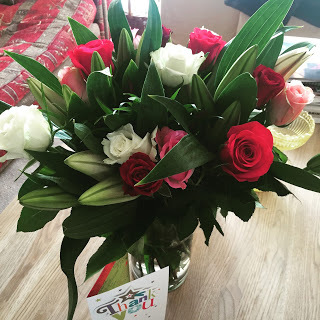 The lovely flowers and card with beautiful messages,
The lovely flowers and card with beautiful messages, which I was given by my colleagues yesterday.
Today is the first day of the rest of my life.
That's such a cliche, I know, but this expression describes so accurately how I'm feeling today. After a night out with my (now former!) colleagues from Finn-Guild and ScanAdventures, I did have a bit of a sore head this morning (Finns!). Even so, I'm bursting with energy.
We are off to Finland for a holiday next week, but after we're back, revamping this blog will be one of my first tasks. As I mentioned in my post a couple of weeks ago, I will be running a series, called 'Advice for New Writers'. First one of these will be up on this blog Friday 4th September.
There will be regular monthly book/film/theatre reviews - first of which will be up on 18th September. The novel I'll be reviewing is 'The Versions of Us' by Laura Barnett.
Other regular features will be Guest Bloggers, Book Offers, News and posts on Expat Life.
So I hope you'll be popping by often to read about my new life as full-time author entrepreneur!
Published on August 22, 2015 10:11



